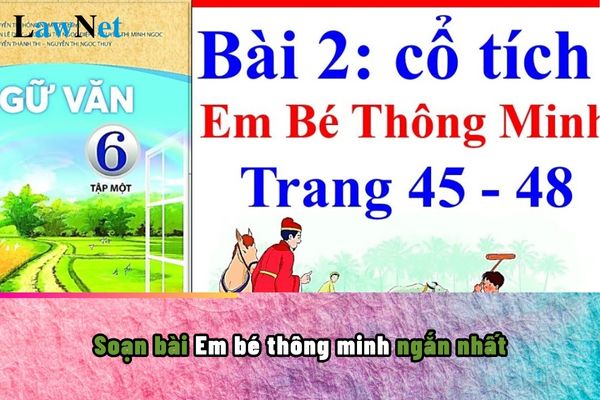What are guidelines on preparing the lesson "Em bé thông minh" for grade 6 students in Vietnam? What are the 6 rights of grade 6 students in Vietnam?
What are guidelines on preparing the lesson "Em bé thông minh" for grade 6 students in Vietnam?
"Em bé thông minh" is one of the lessons that students will study in the grade 6 Literature curriculum.
Students can refer to the following guidelines on preparing the lesson "Em bé thông minh" for grade 6 students:
|
Preparing the Lesson on "Em bé thông minh" *Main Content: |
Note: Information about the preparation for "Em bé thông minh" for grade 6 students is for reference purposes only./.

What are guidelines on preparing the lesson "Em bé thông minh" for grade 6 students in Vietnam? What are the 6 rights of grade 6 students in Vietnam? (Image from Internet)
What are the 6 rights of grade 6 students in Vietnam?
According to the provisions of Article 33 of the Regulations on lower secondary schools, upper secondary schools, and multi-level schools issued together with Circular 32/2020/TT-BGDDT, the age regulations for students at lower secondary schools are as follows:
Age of lower secondary school Students
1. The age of students entering Grade 6 is 11 years. The age of students entering Grade 10 is 15 years. For students who skip grades at the previous educational level or enter an educational level at an age higher than the regulated age, the age for entering Grade 6 and Grade 10 can be reduced or increased based on the age of the year of graduation from the previous educational level.
2. Students from ethnic minorities, students with disabilities, students with special difficulties, and students returning from overseas may enter school at an age up to 3 years older than the regulated age.
.....
Thus, according to the age regulations, grade 6 students in 2024 are 11 years old. This age can be reduced or increased based on the age of the year of graduation from the previous educational level for students who skip grades at the previous level or enter an educational level at an age higher than the regulated age.
Specifically, the following students can enroll in grade 6 at an age up to 3 years older than the regulated age:
- Students from ethnic minorities.
- Students with disabilities.
- Students with special difficulties.
- Students returning from overseas.
What are the 6 rights of grade 6 students in Vietnam?
The rights of lower secondary and upper secondary school students are specified in Article 35 of the regulations issued together with Circular 32/2020/TT-BGDDT:
- Students are entitled to equality in enjoying comprehensive education, guaranteed conditions regarding time, facilities, hygiene, and safety for studying at school and self-learning at home, provided with information about their learning and training, and allowed to use equipment and means for academic, cultural, and sports activities of the school as per regulations.
- Students are respected and protected, treated equally and democratically, have the right to appeal to the school and education management levels about decisions concerning themselves; they have the right to transfer schools for legitimate reasons according to current regulations; they can study ahead of age, skip grades, study at an age older than the regulated age according to Article 33 of the regulations issued with Circular 32/2020/TT-BGDDT.
- Students can participate in activities to develop their talents in subjects, sports, and arts organized by the school if they meet the conditions.
- Students are eligible for scholarships or other allowances according to the regulations for students entitled to social policies, those facing life difficulties, and students with special abilities.
- Students can transfer schools if they meet the conditions as per the regulations; the transfer procedures shall follow the stipulations of the Minister of Education and Training.
- Students are entitled to other rights as prescribed by law.

